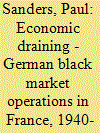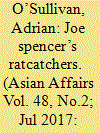|
|
|
Sort Order |
|
|
|
Items / Page
|
|
|
|
|
|
|
| Srl | Item |
| 1 |
ID:
080640


|
|
|
|
|
| Publication |
2008.
|
| Summary/Abstract |
Study of the black market is vital to understanding the social, economic and political stakes of the occupation in the Second World War. It allows a re-examination of German occupation policy, but also highlights civilian survival strategies, wealth distribution and the changing occupier - occupied relationship. In France, the German occupiers spent at least 15% of all financial resources made available to them through the Vichy occupation levy on the illegal market. This purchasing started from the onset of occupation and until the December 1941 resource crisis; German economic agencies bought 'anything, at any price'. This uncoordinated bidding led to a black market bubble, the effects of which spilled over into the official markets where they caused havoc. Spring 1942 brought the centralisation of purchasing. During the ensuing second phase (until spring 1943), the occupier still bought 'anything', but no longer at 'any price'. Although this stabilised prices, it also encouraged illegal production, with raw materials diverted from official industry allocations. During this period 50-60% of all Vichy occupation payments were spent on the black market, at a strategic juncture of the war when such extravagance was no longer justifiable. This undermined German finances in France and became a liability to exploitation and collaboration. The third phase of black market exploitation, from summer 1943 to the end of the occupation, was the most rational. The Germans restricted purchasing to genuinely indispensable strategic raw materials. This built on the effective implementation of a German black market purchasing ban in spring 1943, the support of the Vichy government and French industrial leaders for economic collaboration, business concentrations and closures, market monitoring and resource management methods. As a result, the illegal market in the industrial economy was largely controlled. Arguably the same degree of economic mobilisation could have been achieved one or even two years earlier, had the Germans abstained from unilateral black market purchasing and instead heeded Vichy calls for closer cooperation. German failure in this area was due to lack of coordination, institutional chaos, economic dilettantism, endemic corruption and reckless resource competition; all have their origin in the structure of the Nazi system. Illegal food markets, on the other hand, demonstrated the limits of coercion. As the nutritional value of official civilian rations remained below subsistence level, the French continued to depend on the illegal market for sustenance. Evading food restrictions became something of a national pastime. This further compounded Vichy's lack of willingness (and authority) in enforcing economic regulation in the countryside.
|
|
|
|
|
|
|
|
|
|
|
|
|
|
|
|
| 2 |
ID:
174797


|
|
|
|
|
| Summary/Abstract |
This paper looks at the history of state-making in an entangled imperial frontier. The northeastern frontier of British India was a mosaic of princely states, administered and un-administered territories. The presence of the colonial state in the region was contentious, marked by violence on one hand and philanthropy on the other. The Japanese invasion of the region during World War Two had several unintended ramifications. Wartime and post-war developments produced institutions and social experiences which facilitated the process of state-making in the region. Relief and Rehabilitation project of the colonial state, and later distribution of monetary compensation was not merely governed by moral or legal obligations but was part of a larger project of imperialist reconquest in Asia after the surrender of the Japanese with Manipur and Naga Hills as the base. This project also provided the postcolonial Indian state with institutions to continue the process of state-making of its own.
|
|
|
|
|
|
|
|
|
|
|
|
|
|
|
|
| 3 |
ID:
153008


|
|
|
|
|
| Summary/Abstract |
During the Anglo-Soviet occupation of Persia (Iran), the Tehran-based Defence Security Office was responsible for protecting from Nazi subversion and sabotage three potential strategic targets: the vital oilfields, pipelines, and refineries of Khuzistan; the Lend-Lease supply route between the Persian Gulf and the Soviet Union; and the security of the Persian polity itself. Against all odds, under the command of Lt Col E.L. ‘Joe’ Spencer, this small but effective British/Indian security-intelligence unit succeeded in neutralising the Nazi threat, in capturing all German operatives on Persian soil, and in maintaining the security of a territory five times the size of Britain.
|
|
|
|
|
|
|
|
|
|
|
|
|
|
|
|
|
|
|
|
|